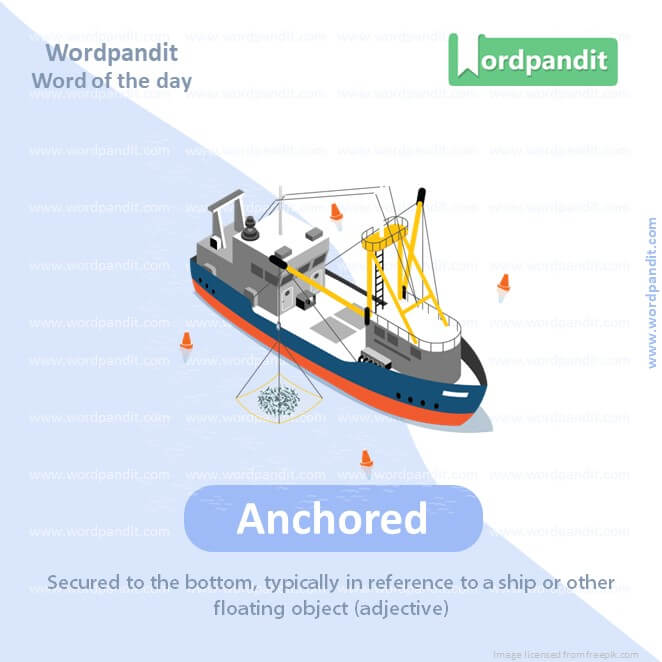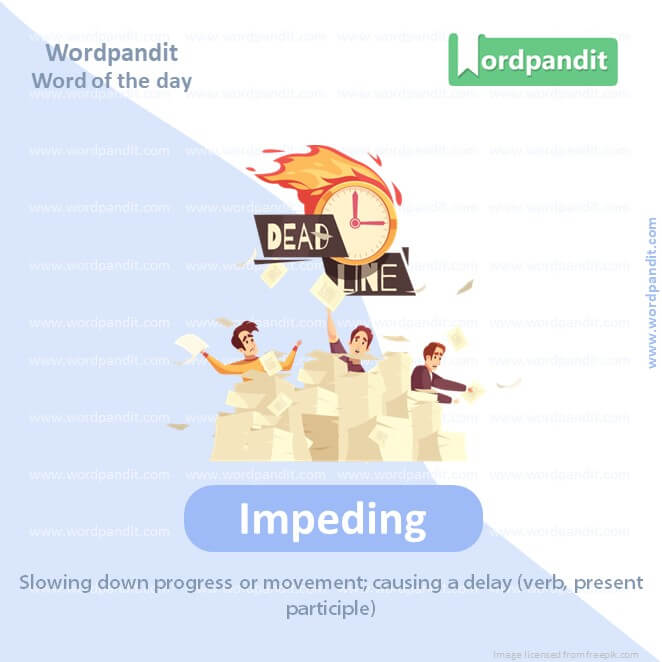Daily Vocabulary Words: List of Daily Used Words in Leading Indian Newspapers
Hi there. Welcome to this special section @ Wordpandit. Our endeavour here is straightforward: highlighting daily vocabulary words that you would come across in leading newspapers in the country. We have included the following newspapers in our selection:
• The Times of India
• The Economic Times
• Hindustan Times
• Mint
• Indian Express
We are putting in extensive work to develop your vocabulary. All you have to do is be regular with this section and check out this post daily. This is your repository of commonly used words; essentially, we are posting a list of daily used words. Hence, this has significant practical application as it teaches you words that are commonly used in leading publications mentioned above.
Visit the website daily to learn words from leading Indian newspapers.

WORD-1: Anchored
CONTEXT: The basic edifice on which social contracts are anchored does not hold any more.
SOURCE: Hindustan times
EXPLANATORY PARAGRAPH: Imagine you have a toy boat, and you don’t want it to float away when you put it in the water. So, you attach a small weight to it, which you call an “anchor.” This anchor goes down into the water and keeps the boat in one place, so it doesn’t drift away. Being “anchored” is just like that; it means staying in one spot and not moving around.
MEANING: Secured to the bottom, typically in reference to a ship or other floating object (adjective).
PRONUNCIATION: AN-kerd
SYNONYMS: Moored, Secured, Fastened, Fixed, Attached, Stable, Rooted
USAGE EXAMPLES:
1. The boat was anchored near the shore to avoid drifting away with the current.
2. They felt anchored by their strong family ties.
3. The old tree’s roots anchored it firmly to the ground.
4. The teacher’s advice anchored her confidence during the competition.

WORD-2: Sacerdotal
CONTEXT: China has a unique authoritarian system, having institutionalised a peaceful transfer of power every 10 years. Within the sacerdotal of the Communist Party, there was sharp contestation for power.
SOURCE: Hindustan times
EXPLANATORY PARAGRAPH: Think about a person who works at a church, like a priest, who has special jobs like leading prayers or ceremonies. “Sacerdotal” is a big word that talks about anything related to these special church jobs or the people who do them. It’s like saying something is “priestly” or about the work priests do.
MEANING: Related to priests or the priesthood, especially concerning their duties (adjective).
PRONUNCIATION: sa-ser-DO-tal
SYNONYMS: Priestly, Clerical, Ecclesiastical, Spiritual, Religious, Holy, Sacred
USAGE EXAMPLES:
1. The sacerdotal duties include conducting services and providing guidance to the community.
2. He wore sacerdotal robes during the ceremony.
3. The sacerdotal tradition has been passed down through generations.
4. Their role in the church is highly sacerdotal.

WORD-3: Impeding
CONTEXT: This starts impeding economic decisions as they are made on flawed data.
SOURCE: Hindustan times
EXPLANATORY PARAGRAPH: Imagine you’re running in a race, and someone puts a bunch of toys on the track. Those toys make it harder for you to run fast; they slow you down. When something is “impeding” you, it’s just like those toys on the track. It’s anything that makes it harder for you to do what you’re trying to do.
MEANING: Slowing down progress or movement; causing a delay (verb, present participle).
PRONUNCIATION: im-PEED-ing
SYNONYMS: Hindering, Obstructing, Blocking, Thwarting, Stalling, Delaying, Hampering
USAGE EXAMPLES:
1. The heavy snow was impeding traffic.
2. A lack of funds is impeding our research project.
3. The fallen tree was impeding the path.
4. Regulations are often seen as impeding business growth.

WORD-4: Emboldened
CONTEXT: Russia, Iran, and North Korea to close ranks and feel emboldened to suppress democratic institutions.
SOURCE: Hindustan times
EXPLANATORY PARAGRAPH: Imagine you’re a little scared to jump into the pool, but your friend cheers you on, saying you can do it. Suddenly, you feel brave and ready to jump. When you feel “emboldened,” it’s like getting a boost of courage from somewhere, making you feel strong and ready to do something you were afraid of before.
MEANING: Made more confident or courageous (adjective).
PRONUNCIATION: em-BOL-den-d
SYNONYMS: Encouraged, Strengthened, Heartened, Inspired, Motivated, Fortified, Energized
USAGE EXAMPLES:
1. The team felt emboldened after the coach’s pep talk.
2. The success of the project emboldened them to take on more challenging tasks.
3. The support from her friends emboldened her to speak up.
4. The victory emboldened the movement’s supporters.
WORD-5: Excavations
CONTEXT: A string of excavations starting in the colonial period with the discovery of the iconic Lion emblem in 1904-05 have established that the region was under emperor Ashoka (who reigned from 268 to 232 BCE).
SOURCE: Hindustan times
EXPLANATORY PARAGRAPH: Think about when you dig in the sand at the beach to make a big hole or a castle. “Excavations” are just like that but on a much bigger scale. Scientists and builders dig in the earth to find old things like dinosaur bones or to make space for new buildings. It’s like playing in the dirt, but for very important reasons.
MEANING: The process of digging out and removing earth or the site where digging has occurred, often for discovery or construction purposes (noun).
PRONUNCIATION: eks-kuh-VAY-shuhns
SYNONYMS: Digging, Unearthing, Digs, Archaeology, Trenches, Mining, Quarrying
USAGE EXAMPLES:
1. The excavations at the ancient site revealed pottery and tools.
2. Excavations for the new building will start next week.
3. The archaeologist led the excavations in search of the lost city.
4. Safety measures are important during large-scale excavations.
WORD-6: Stemming
CONTEXT: It is Tulsidas’s Ramayana that remains the Bible for Hindus in Hindi-speaking areas and is rightly credited for stemming the erosion of followers in the medieval period.
SOURCE: Hindustan times
EXPLANATORY PARAGRAPH: Imagine you’re walking up a stream and you start putting rocks in it to stop the water from flowing so easily. “Stemming” is a lot like putting those rocks in the stream. It means trying to stop something from happening or spreading, like trying to keep water from flowing or stopping a rumor from spreading around school.
MEANING: Originating from, or stopping the flow or spread of something (verb, present participle).
PRONUNCIATION: STEM-ing
SYNONYMS: Arising, Deriving, Halting, Preventing, Ceasing, Checking, Controlling
USAGE EXAMPLES:
1. Efforts are being made to stem the spread of the disease.
2. The flood of questions was stemming from a misunderstanding.
3. They’re trying to stem the loss of customers.
4. New policies are aimed at stemming the tide of pollution.
WORD-7: Profanity
CONTEXT: The excessive sacredness of the priest and the unabashed profanity of the ash covered Aghori or the stringent Brahmin orthodoxy and the liberating message of Buddha and Kabir.
SOURCE: Hindustan times
EXPLANATORY PARAGRAPH: Think about words that your parents or teachers say you shouldn’t use because they’re not nice or polite words that might get you in trouble if you say them at school. “Profanity” is the name for those kinds of words. It’s when people use words that can be offensive or very rude.
MEANING: Offensive language or swearing (noun).
PRONUNCIATION: proh-FAN-ih-tee
SYNONYMS: Swearing, Curse Words, Vulgarity, Obscenity, Bad Language, Expletives, Curses
USAGE EXAMPLES:
1. The movie was full of profanity.
2. He apologized for his use of profanity during the argument.
3. The school has a strict policy against profanity.
4. Profanity is often discouraged in professional settings.
WORD-8: Decaying
CONTEXT: The struggle between the old and decaying and the new and unformed is both the boon and bane of this city.
SOURCE: Hindustan times
EXPLANATORY PARAGRAPH: Think about when you leave a piece of fruit out for too long, and it starts to look bad and smell funny. That’s because it’s getting old and breaking down. “Decaying” means just that—something getting older and starting to fall apart or not look as good. It can happen to food, leaves, or even old buildings.
MEANING: Breaking down or decomposing, typically organic matter (verb, present participle).
PRONUNCIATION: deh-KAY-ing
SYNONYMS: Rotting, Decomposing, Deteriorating, Spoiling, Perishing, Disintegrating, Moldering
USAGE EXAMPLES:
1. The decaying leaves enriched the soil.
2. The old house was slowly decaying.
3. Decaying food should be thrown away.
4. Scientists study the decaying process of matter.

WORD-9: Enhancing
CONTEXT: A new study reveals soil microbes’ crucial role in enhancing tea flavour.
SOURCE: Hindustan times
EXPLANATORY PARAGRAPH: Imagine you have a plain drawing, and then you decide to add lots of colorful details to make it prettier and more interesting. “Enhancing” is when you make something better or improve it in some way, just like adding colors to your drawing to make it stand out.
MEANING: To improve or augment, especially in effectiveness, value, or attractiveness (Verb).
PRONUNCIATION: en-HAN-sing
SYNONYMS: Improving, Boosting, Augmenting, Elevating, Strengthening, Enriching, Amplifying
USAGE EXAMPLES:
1. Enhancing the lighting in the room made it more inviting.
2. They are working on enhancing the software’s features.
3. Enhancing customer service is a priority for the company.
4. The project aims at enhancing the community’s facilities.
WORD-10: Exquisite
CONTEXT: There’s nothing quite like its exquisite muscatel flavour that comes from the meticulous care of tea shrubs in the hilly gardens of the foothills of the Himalayas in my home state.
SOURCE: Hindustan times
EXPLANATORY PARAGRAPH: Think about the prettiest, most special toy or dress you’ve ever seen—something so nice that it makes you say “wow!” “Exquisite” is a word used to describe things that are very, very beautiful or perfect in a special way. It’s like saying something is so wonderful that it’s hard to find anything else like it.
MEANING: Extremely beautiful and delicate (adjective).
PRONUNCIATION: eks-KWI-zit
SYNONYMS: Beautiful, Elegant, Fine, Superb, Delightful, Lovely, Splendid
USAGE EXAMPLES:
1. She wore an exquisite piece of jewelry.
2. The chef prepared an exquisite meal.
3. The craftsmanship of the vase was exquisite.
4. They stayed at an exquisite little hotel in the countryside.
vocabulary in use
In the realm of language education, the concept of ‘vocabulary in use’ is exceptionally integral. It refers not merely to the memorization of words, but the practical application of those words within context-rich sentences and conversation. Essentially, ‘vocabulary in use’ stands as the wholesome approach to learning words and phrases the way they are prevalently used in language.
Many language learners stumble upon the roadblock of using vocabulary out of context. Hence, to prevent such linguistic disaster, ‘vocabulary in use’ comes as a rescue. It encourages learners to understand the words, their meanings, nuances, and appropriate application, making language use more authentic and natural.
How should ‘vocabulary in use’ be learned? The efficient approach to this is shifting from the age-old tradition of rote memorization to a modern application-based learning strategy. Put simply, it involves immersing oneself in a language-rich environment. For instance, you may read books, watch series, engage in conversations, or listen to music in your target language. This provides opportunities to encounter ‘vocabulary in use’ in its natural context, which facilitates deeper understanding, recall, and appropriate usage.
Deconstructing the ‘vocabulary in use’ further, learners should focus both on the meaning and usage of new words. Once a learner encounters a new word, they shouldn’t just learn what it means – they should also learn how and when it’s used. This provides an understanding of the contextual and stylistic application of the word.
To conclude, ‘vocabulary in use’ is an anchor point in language learning. This approach goes beyond plain memorization and encourages understanding words in their practical and conversational contexts. A conscious effort to learn ‘vocabulary in use’ can, indeed, enhance linguistic fluency, competency, and overall communication skills. As you journey to language mastery, remember, ‘vocabulary in use’ is your quintessential comrade!













